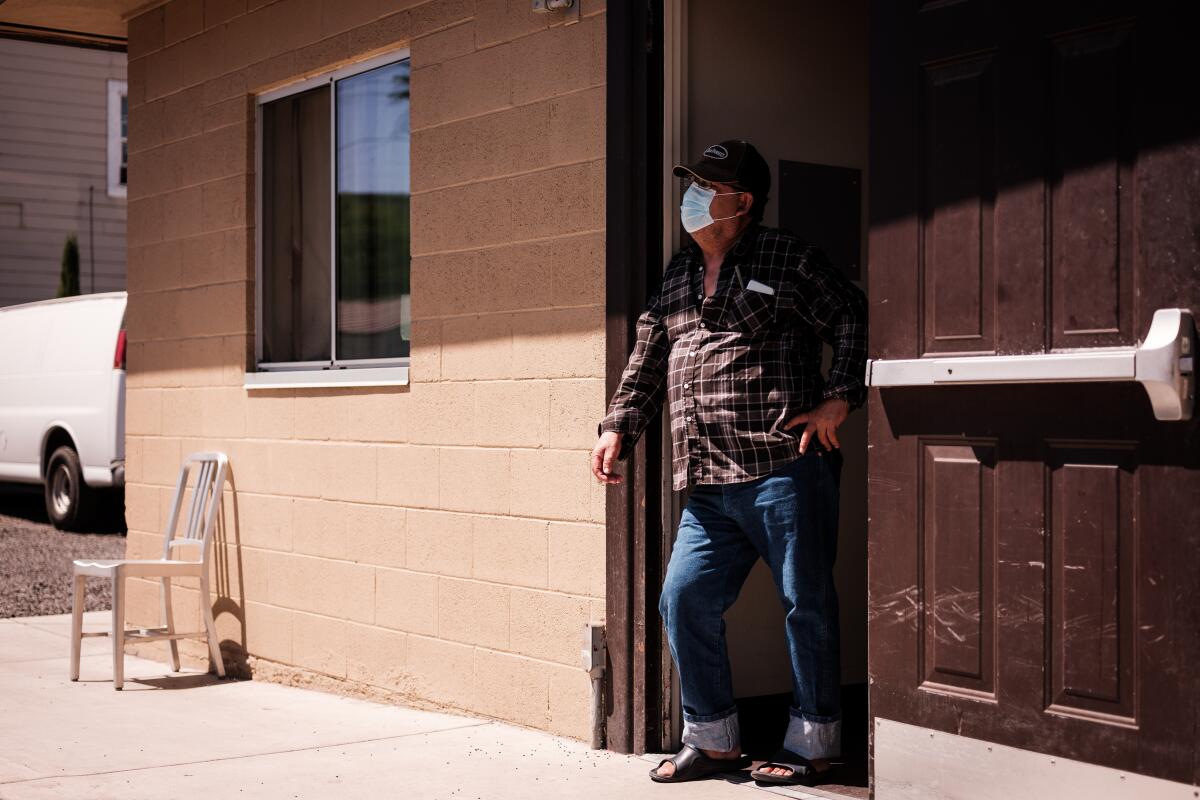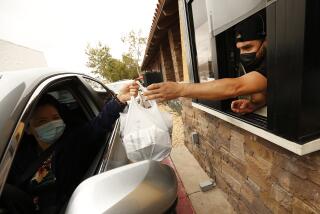California won’t conquer the coronavirus, and fully reopen, until it can protect essential workers

- Share via
SAN FRANCISCO — Five months into the pandemic, it’s becoming increasingly clear that California is not going to conquer the coronavirus until it dramatically improves safety measures for essential workers at the epicenter of the health crisis.
From farming communities to urban centers and suburbs, workers in retail, manufacturing, agriculture and logistics are bearing the brunt of COVID-19 outbreaks, and state and local officials are struggling to control the infections even as the outlook in more prosperous communities has improved.
A growing number of officials and health experts say it’s critical now for California to act more aggressively, including pushing for masks and social distancing measures inside workplaces as well as cracking down much harder on employers who don’t follow the rules.
But that is only part of the problem. Some low-wage workers are reluctant to call in sick because they need the money and are afraid to report safety violations for fear of being fired. To deal with that, the state might need to provide additional disability pay to those who become ill and a process to aid workers who face retaliation for speaking out.
It’s a particular challenge because many of these industries were ripe for worker exploitation before the pandemic. Some workers lack legal residency and are fearful of working with authorities and crossing their bosses. But experts say California has no hope of fully reopening the economy unless it can get worker infections under control.
“What we’re talking about are low-wage workers — workers that don’t themselves have enough protection,” said Dr. Kirsten Bibbins-Domingo, chair of UC San Francisco’s Department of Epidemiology and Biostatistics. “They need protection of wages in order to be off of work … and they need protections to be able to come back to work.”
She and others acknowledge it’s going to be difficult. Some of these workers are hired by middle men instead of big corporations, and building trust in government action is going to be essential.
“If we as a state — and then the counties most heavily affected — are going to get these sectors under control, we’re going to have to deal with the messiness of this,” Bibbins-Domingo said. “We call these essential workers because the sectors they’re working in are essential to the California economy. And it’s essential, therefore, that we figure out” how to protect them.
Latinos in California are being infected and dying from the coronavirus at rates significantly higher than white residents, driven by job and housing conditions that continually bring them into contact with others, facilitating the spread of COVID-19. While Latinos — the state’s largest ethnic group — make up 39% of California’s population, they make up 56% of all coronavirus cases and 46% of deaths.
Some of the state’s largest outbreaks have occurred at factories, food processing plants, and housing complexes for agricultural workers, both in cities and in agricultural communities.
There is a potential model for this fight in nursing homes, where many Californians who died from the virus were infected. If officials have been able to figure out how to reduce the spread there through widespread adoption of masks and improved infection control procedures, they can probably protect low-income essential workers, experts said.
“If you can cut this in a hospital or a nursing home, almost certainly you can handle it somewhere else. That’s a no brainer,” said Dr. Shruti Gohil, associate medical director of epidemiology and infection prevention at UC Irvine.
With coronavirus raging in Latino communities in the Central Valley, Gov. Gavin Newsom on Monday announced $52 million in additional aid aimed at education, testing and tracing. But many say much more must be done.
“Under this pandemic we were unprepared ... and too many farmworkers and essential workers are at risk,” said state Assemblyman Robert Rivas (D-Hollister), whose grandfather was a farmworker. “That needs to change.”
Rivas has pushed a relief package of five bills for farmworkers since March. While many of those provisions were put in place by Newsom on Monday, he and others said there are more big-picture fixes that need to happen to protect workers, and ultimately the California economy, which relies on their labor. Fixes he would like to see include more safe isolation spaces and housing, more enforcement by state worker safety agencies and better sick leave and unemployment, especially for undocumented workers with no safety net.
The situation on the ground in rural areas is dire.
The calls come in to the Rev. Nelson Rabell’s cellphone every day now: Latino workers desperate for help, for rent, for medical care.
From his Lutheran parish in Lodi in the Central Valley, he has worked with his wife, an epidemiologist and dentist, to provide aid — money, food, tests — since the coronavirus began. Many of his parishioners are poor, working jobs in fields, grocery stories, day care centers and medical facilities.
But what he can do is not enough.
“They are suffering a lot,” Rabell said. “It’s just the perfect storm of irresponsible government action at all levels.”
He believes government needs to provide direct financial aid to workers, especially those who are infected, so that they can stay home from work without fear of their families being without food or shelter. Though Newsom’s aid package increases quarantine housing for workers who can’t isolate at home and provides sick leave for more workers, Rabell points out that many of those in essential jobs live paycheck to paycheck and need immediate money if they fall ill.
Rabell said there must be “robust accountability and supervision” of workplaces such as farms and packing plants, including greater penalties for employers who don’t comply with social distancing or provide protective gear.
Jose Rodriguez, director of El Concilio, which runs housing and programs for farmworkers in San Joaquin County, said he believes government needs to also be stricter with isolation and quarantine rules, and better at contact tracing, so that those exposed to the virus are clear about quarantine protocols. In his county, as in many places in the Central Valley, health departments have been overwhelmed by the spiraling number of cases and unable to contact trace each positive, leaving many not even knowing they may be carrying the virus.
He said one of his cousins in Sutter County recently tested positive. A day after receiving the results, county health workers came to her house and instructed all the residents that they had to quarantine for 14 days, and have made repeated checks since to make “sure the family is doing what they are told.”
“Unless someone is doing that here, they are not taking it seriously,” he said.
Lin reported from San Francisco, Chabria from Sacramento. Times staff writer Iris Lee contributed to this report.
More to Read
Sign up for Essential California
The most important California stories and recommendations in your inbox every morning.
You may occasionally receive promotional content from the Los Angeles Times.












